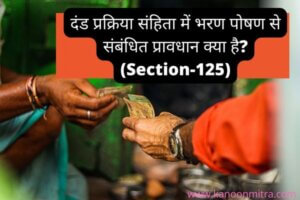संपत्ति अंतरण अधिनियम की धारा 58 – “बंधक”, “बंधककर्ता”, “बंधकदार”, “बंधक धन” और “बंधक विलेख” की परिभाषा—
(क) बन्धक-विनिर्दिष्ट स्थावर सम्पत्ति में के किसी हित का वह अन्तरण है जो उधार के तौर पर दिए गए या दिए जाने वाले धन के संदाय को या वर्तमान या भावी ऋण के संदाय को या ऐसे वचनबन्ध का पालन, जिससे धन सम्बन्धी दायित्व पैदा हो सकता है, प्रतिभूत करने के प्रयोजन से किया जाता है।
अन्तरक बन्धककर्ता और अन्तरिती बन्धकदार कहलाता है, मूलधन और ब्याज, जिनका संदाय तत्समय प्रतिभूत है, बन्धक धन कहलाते हैं और वह लिखत (यदि कोई हो), जिसके द्वारा अन्तरण किया जाता है बन्धक विलेख कहलाती है।
(ख) सादा बंधक- जहां कि बन्धककर्ता बन्धक-सम्पत्ति का कब्जा परिदत्त किए बिना बन्धक धन चुकाने के लिए अपने को व्यक्तित: आबद्ध करता है और अभिव्यक्त या विवक्षित तौर पर करार करता है कि उस संविदा के अनुसार संदाय करने में उसके असफल रहने की दशा में बन्धकदार को बन्धक-सम्पत्ति का विक्रय कराने का और विक्रय के आगमों को जहां तक वह आवश्यक हो बन्धक धन के संदाय में उपयोजित कराने का अधिकार होगा, वहाँ वह संव्यवहार सादा बंधक और बन्धकदार सादा बन्धकदार कहलाता है।
(ग) सशर्त विक्रय द्वारा बंधक—जहां कि कोई बन्धककर्ता बन्धक-सम्पत्ति को दृश्यतः बेच देता है
सशर्त पर कि किसी निश्चित तारीख को बन्धक धन के संदाय में व्यतिक्रम होते ही विक्रय आत्यन्तिक हो जाएगा, अथवा
इस शर्त पर कि ऐसा संदाय किए जाने पर विक्रय शून्य हो जाएगा, अथवा
इस शर्त पर कि ऐसा संदाय किए जाने पर क्रेता वह सम्पत्ति को अन्तरित कर देगा, वहाँ ऐसा संव्यवहार सशर्त विक्रय द्वारा बन्धक और बन्धकदार सशर्त विक्रय द्वारा बन्धकदार कहलाता है :
- परन्तु ऐसा कोई भी संव्यवहार बन्धक नहीं समझा जाएगा जब तक कि वह शर्त उस दस्तावेज में सन्निविष्ट न हो जिससे विक्रय किया गया है या किया जाना तात्पर्यित है।
(घ) भोग-बन्धक– जहाँ कि बन्धककर्ता बन्धक-सम्पत्ति का कब्जा बन्धकदार को परिदत्त कर देता है या परिदत्त करने के लिए अपने को अभिव्यक्त या विवक्षित तौर पर आबद्ध कर लेता है और उसे प्राधिकृत करता है कि बन्धक धन का संदाय किए जाने तक वह ऐसा कब्जा प्रतिधृत करे और उस सम्पत्ति से प्रोद्भूत भाटकों और लाभों को या ऐसे भाटकों और लाभों के किसी भाग को प्राप्त करे और उन्हें ब्याज मद्धे या बन्धक धन के संदाय में या भागतः व्याज मद्धे या भागतः बन्धक धन के संदाय में, विनियोजित कर ले, वहां वह संव्यवहार भोग-बन्धक और वह बन्धकदार भोग-बन्धकदार कहलाता है।
(ङ) अंग्रेजी बंधक – जहां कि बन्धककर्ता बन्धक धन का प्रतिसंदाय निश्चित तारीख को करने के लिए अपने को आबद्ध करता है और बन्धक-सम्पत्ति को बन्धकदार को आत्यन्तिक रूप से किंतु इस परन्तुक के अध्यधीन अन्तरित करता है कि करार के अनुसार बन्धक धन के संदाय पर बन्धकदार उसे बन्धककर्ता को प्रति-अन्तरित कर देगा, वहां वह संव्यवहार अंग्रेजी बन्धक कहलाता है।
(च) हक-विलेखों के निक्षेप द्वारा बंधक—जहां कि कोई व्यक्ति निम्नलिखित नगरों, अर्थात् कलकत्ता, मद्रास और मुम्बई नगरों में से किसी में और किसी भी अन्य नगर में, जिसे संपृक्त राज्य सरकार शासकीय राजपत्र में अधिसूचना द्वारा इस निमित्त विनिर्दिष्ट करे, किसी लेनदार को या उसके अभिकर्ता को स्थावर सम्पत्ति की हक की दस्तावेजों को, उस सम्पत्ति पर प्रतिभूति सृष्ट करने के आशय से परिदत्त करता है, वहां वह संव्यवहार हक-विलेखों के निक्षेप द्वारा बन्धक कहलाता है।
(छ) विलक्षण बंधक- जो बन्धक इस धारा के अर्थ में सादा बन्धक, सशर्त विक्रय द्वारा बन्धक, भोग-बन्धक, अंग्रेजी बन्धक या हक-विलेखों के निक्षेप द्वारा बन्धक नहीं है, वह विलक्षण बन्धक कहलाता है।]
Section 58 TPA – Mortgage , mortgagor , mortgagee , mortgage-money and mortgage- deed defined –
(a) A mortgage is the transfer of an interest in specific immoveable property for the purpose of securing the payment of money advanced or to be advanced by way of loan, an existing or future debt, or the performance of an engagement which may give rise to a pecuniary liability.
The transferor is called a mortgagor, the transferee a mortgagee; the principal money and interest of which payment is secured for the time being arc called the mortgage -money, and the instrument (if any) by which the transfer is effected is called a mortgage -deed.
(b) Simple mortgage.– Where, without delivering possession of the mortgaged property, the mortgagor binds himself personally to pay the mortgage-money, and agrees, expressly or impliedly, that, in the event of his failing to pay according to his contract, the mortgagee shall have a right to cause the mortgaged property to be sold and the proceeds of sale to be applied, so far as may be necessary, in payment of the mortgage-money, the transaction is called a simple mortgage and the mortgagee a simple mortgagee.
(c) Mortgage by conditional sale.— Where the mortgagor ostensibly sells the mortgaged property–
on condition that on default of payment of the mortgage-money on a certain date the sale shall become absolute, or
on condition that on such payment being made the sale shall become void, or
on condition that on such payment being made the buyer shall transfer the property to the seller,
the transaction is called a mortgage by conditional sale and the mortgagee a mortgagee by conditional sale: संपत्ति अंतरण अधिनियम की धारा 58
1[Provided that no such transaction shall be deemed to be a mortgage, unless the condition is embodied in the document which effects or purports to effect the sale.]
(d) Usufructuary mortgage.-– Where the mortgagor delivers possession 2[or expressly or by implication binds himself to deliver possession] of the mortgaged property to the mortgagee, and authorises him to retain such possession until payment of the mortgage -money, and to receive the rents and profits accruing from the property 3[or any part of such rents and profits and to appropriate the same] in lieu of interest, or in payment of the mortgage -money, or partly in lieu of interest 4[or] partly in payment of the mortgage-money, the transaction is called an usufructuary mortgage and the mortgagee an usufructuary mortgagee.
(e) English mortgage.-– Where the mortgagor binds himself to repay the mortgage-money on a certain date, and transfers the mortgaged property absolutely to the mortgagee, but subject to a proviso that he will re-transfer it to the mortgagor upon payment of the mortgage-money as agreed, the transaction is called an English mortgage. संपत्ति अंतरण अधिनियम की धारा 58
5[(f) Mortgage by deposit of title-deeds.– Where a person in any of the following towns, namely, the towns of Calcutta, Madras 6[and Bombay], 7*** and in any other town which the 8[State Government concerned] may, by notification in the Official Gazette, specify in this behalf, delivers to a creditor or his agent documents of title to immoveable property, with intent to create a security thereon, the transaction is called a mortgage by deposit of title-deeds. संपत्ति अंतरण अधिनियम की धारा 58
(g) Anomalous mortgage.– A mortgage which is not a simple mortgage, a mortgage by conditional sale, an usufructuary mortgage, an English mortgage or a mortgage by deposit of title-deeds within the meaning of this section is called an anomalous mortgage.]
1. Added by Act 20 of 1920 , s . 1 9 .
2 . I n s . b y s . 1 9 , i b i d .
3. Subs. by s. 19, ibid., for and to appropriate them.
4. Subs. by s. 19, ibid, for and.
5. Added by Act 20 of 1929, s. 19.
6. Subs. by the A.O. 1948, for Bombay and Karachi. The word and had been ins. by the A.O. 1937.
7. The words “Rangoon, Moulmein, Bassein and Akyab” omitted by the A.O. 1937.
8. The words “Governor General in Council” successively amended by the A.O. 1937 and the A.O. 1950 to read as above.
संपत्ति अंतरण अधिनियम की धारा 58 संपत्ति अंतरण अधिनियम की धारा 58 संपत्ति अंतरण अधिनियम की धारा 58



